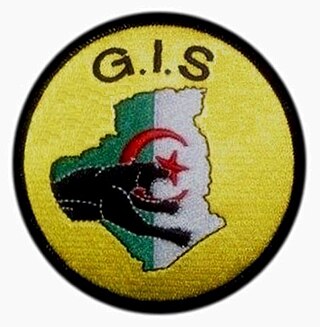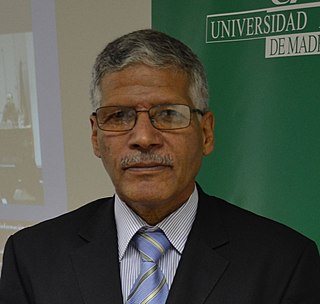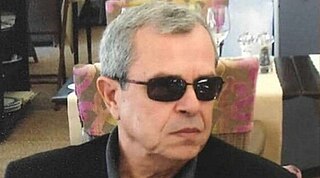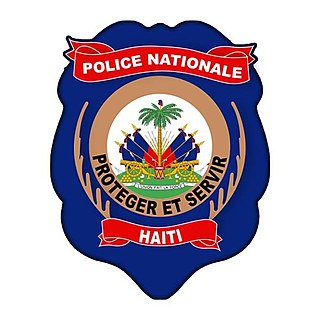
Mohamed Boudiaf, also called Si Tayeb el Watani, was an Algerian political leader and one of the founders of the revolutionary National Liberation Front (FLN) that led the Algerian War of Independence (1954–1962). Boudiaf was exiled soon after Algerian independence, and did not go back to Algeria for 27 years. He returned in 1992 to accept a position of Chairman of the High Council of State, but was assassinated four months later.

The National Police, formerly known as the Sûreté nationale, is one of two national police forces of France, the other being the National Gendarmerie. The National Police is the country's main civil law enforcement agency, with primary jurisdiction in cities and large towns. By contrast, the National Gendarmerie has primary jurisdiction in smaller towns, as well as in rural and border areas. The National Police comes under the jurisdiction of the Ministry of the Interior and has about 145,200 employees. Young French citizens can fulfill their mandatory service in the police force.

The Special Intervention Group is a special forces group created in Algeria in 1987, initially with 400 members.

Hocine Aït Ahmed was an Algerian politician. He was founder and leader until 2009 of the historical political opposition in Algeria.
The Organization of Young Free Algerians was a pro-government armed group that claimed credit for various attacks against civilians who sympathised with the Islamists during the Algerian Civil War. It was active mainly in 1994 and 1995. However, it was a front under which elements of the DRS, the Algerian security services, operated. OJAL never existed as an independent organisation.

Abdelkader Taleb Omar is a Sahrawi politician who serves as the ambassador of Sahrawi Arab Democratic Republic to Algeria since 17 March 2018. He is a former prime minister.

Fatiha Boudiaf is an Algerian activist, widow and second wife of former Algerian President Mohamed Boudiaf. After his assassination in 1992, she set up the Boudiaf Foundation to spread her husband's message of peace. She has been an outspoken critic of the conviction of Lambarek Boumaarafi, saying that a larger conspiracy was involved in the death of her ex-husband and has demanded that the investigation is reopened.

General Mohamed Mediène, also known as Toufik (توفيق), is an Algerian intelligence officer who formerly served as head of the country's secret services, the Intelligence and Security Department, from 1990 to 2015. He was described as the world's longest serving "intelligence chief" and nicknamed le chakal.

The Haitian National Police is the law enforcement and de facto police force of Haiti. It was created in 1995 to bring public security under civilian control as mandated in Haiti's constitution. As at 2023 the force has only 9,000 active duty officers.

The Provisional Government of the Algerian Republic was the government-in-exile of the Algerian National Liberation Front (FLN) during the latter part of the Algerian War of Independence (1954–62).
The Agence Nationale de Renseignements (ANR) is a government intelligence agency of the Democratic Republic of the Congo (DRC). The role of the agency is to ensure "internal security and external security" of the state. The agency was strongly criticized for the disrespect of human rights by several organisations. Inzun Kakiak has led the agency since 2019.

The Department of Intelligence and Security (DRS) was the Algerian state intelligence service. Its existence dates back to the struggle for independence.
Lt. Gen. Mohamed Lamari was Chief of Staff of the Algerian army during most of the Algerian Civil War.
Major General Smain Lamari was the head of an Algerian intelligence service, the Department of Counter-Espionage and Internal Security.
The assassination of Mohamed Boudiaf took place on 29 June 1992. As Chairman of the High Council of Algeria, Boudiaf was killed by one of his own bodyguards, Lambarek Boumaarafi, who was presented officially as an Islamic fundamentalist, and a sympathiser of the Islamic Salvation Front (FIS), who acted alone. He was assassinated in Annaba while addressing a public meeting on June 29, 1992, which was later broadcast on national TV.
Operation Blue Bird was a mission carried out by France's foreign intelligence service, the SDECE, in 1956 during the second year of the Algerian War of Independence. Its aim was to turn several hundred Kabyle people against the Algerian resistance known as the National Liberation Front (FLN), with the hopes of creating a clandestine counter-resistance force. These Kabyle fighters were known as Force K.
Saïd Bouteflika is an Algerian politician and academic. He is the brother and was a special adviser of Abdelaziz Bouteflika in his former role as President of Algeria, on whom he would have had "considerable influence", especially after the president suffered a serious stroke in 2013. He was also an assistant professor at the University of Science and Technology Houari Boumediene (USTHB).
Brahim Boushaki, was an Algerian Scholar, Imam and Sufi Sheikh. He was born in the village of Soumâa near the town of Thénia 53 km east of Algiers. He was raised in a very spiritual environment within Zawiyet Sidi Boushaki with high Islamic values and ethics. He had great interpersonal skills and devoted his entire life in service of Islam and Algeria according to the Algerian Islamic reference.
Mohamed Aïchaoui was an Algerian journalist and militant in the nationalist movement against French Algeria. Aïchaoui wrote the Declaration of 1 November 1954, the National Liberation Front's first appeal to the Algerian people at the start of the Algerian War. After earlier imprisonment and torture, he died in a 1959 clash with the French army.
The Declaration of 1 November 1954 is the first independentist appeal addressed by the National Liberation Front (FLN) to the Algerian people, marking the start of the Algerian Revolution and the armed action of the National Liberation Army (ALN).









